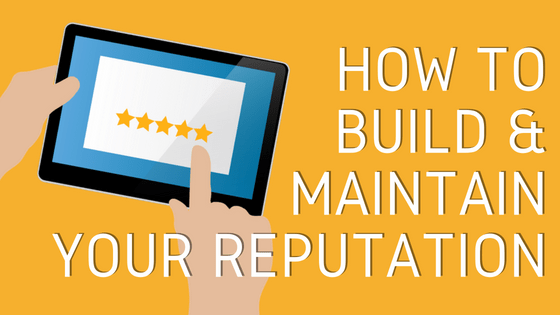Owning your own business is all about following strategies – an operational strategy, financial strategy, marketing strategy…the list goes on. One thing you may leave off that list, but shouldn’t, is a reputation strategy. Whether your business is large or small and regardless of the industry you’re in, the way your business (or nonprofit) is portrayed can make or break it. While providing a good product or service and customer service is important, it takes more than that to build and maintain a reputation as the best.
Decide on Best Practices, and Live Up to Them
Without a strong foundation, a business will have a hard time holding up. That foundation is constructed with guiding principles and ethics that should always be followed. Deciding what those are for you and your business can help pave the way to a positive reputation.
A few examples would include an ethics policy and/or employee policy manual that addresses how employees should act in certain circumstances; rules on how and when to reply to online reviews; the company’s stance on engaging in politics or local hot-button issues; your approach to philanthropy so decisions are made strategically and not emotionally and can’t be misconstrued, etc. These should be documented and provided to existing and new employees for consistency.
Everyone on your team should be aware of best practices and understand why they’re important. Keep them top of mind when creating content, posting to social media, or interacting with customers, as everything you distribute connects and contributes to your image.
Establish an Online Presence, and Sustain It
The majority of the world practically lives online now, so ensuring your business is present and well-represented online is essential. Consumers thoroughly research a business online before deciding to interact with it, and chances are if they don’t find anything, they won’t bother. Your business should have its own website, and be on major social media channels like Facebook, Twitter, LinkedIn, and/or Instagram (as appropriate for your industry and to the extent that you can maintain).
Part of maintaining a reputation is maintaining your business’s online presence. People like to see updates and engage with who they’re doing business with. Consistent posting on your social channels and involvement with your followers encourages them to continue building a relationship with you, and even recommend you to their friends. Consider planning your posts with frequency in mind (I.E. 3 posts a week on Facebook) so you’re sure to keep it up – even when you get busy or go on vacation.
Encourage Reviews, and Monitor Them
Review sites are a significant part of reputation building and maintenance. A saying we’ve heard before is, “opinions are like belly buttons. Everyone has one.” And now, with social media and sites like Yelp, they can be shared with the masses! You know your staff does a great job, but your potential customers often need to hear it from others to believe it. Register on Yelp, TripAdvisor and Google, and encourage your existing customers to post their reviews by linking from your website and social channels or including a request on your fliers, brochures and a sign at your place of business.
It’s not enough to just ask for reviews; you also have to respond to them. Don’t be afraid to share the positives and definitely don’t ignore the negatives. Addressing complaints and offering solutions can not only amend a bad transaction, but it shows potential customers that you take issues seriously.
Yes, building and maintaining a reputation for your business can take a lot of work. If you feel like you can’t tackle it alone (and chances are, you shouldn’t), we’re happy to help. If you’d like to talk about how, get in touch today.

